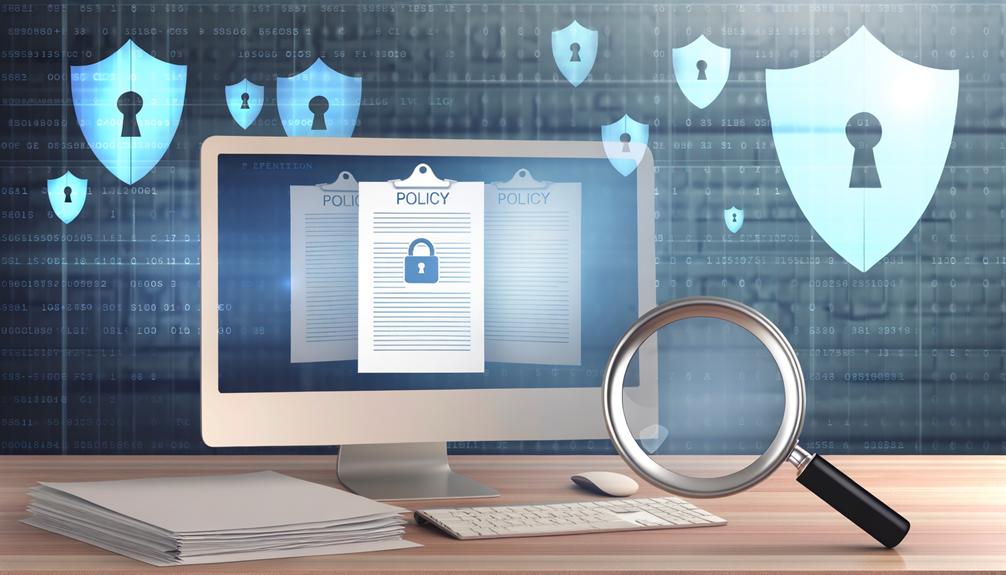Table of Contents Show
Cyber insurance is essential for your small business, as it protects you from the financial fallout of cyber attacks. These attacks can cripple your operations and cost you an average of $200,000. Cyber insurance covers expenses like data recovery, legal fees, and system repairs. Without it, your business could face devastating losses. Small businesses are prime targets for cybercriminals, and cyber insurance helps manage the risks. It also covers liability claims if sensitive customer data is stolen. By integrating cyber insurance with strong cybersecurity practices, you build a robust defense against threats. Want to know more about protecting your business?
Key Takeaways
- Cyber insurance mitigates financial risks from cyber attacks, protecting small businesses from potential financial ruin.
- It covers costs associated with data breaches, including legal fees, settlements, and regulatory fines.
- Cyber insurance offers protection against both first-party and third-party cyber risks, ensuring comprehensive coverage.
- It provides recovery support for data breaches, including system repairs and data recovery efforts.
- Integrating cyber insurance with cybersecurity practices strengthens a business's defense against cyber threats.
Importance of Cyber Insurance
For small businesses, cyber insurance is an essential safeguard against the significant financial risks posed by cyber attacks. You might think your business is too small to be a target, but cybercriminals often prey on small businesses due to weaker cybersecurity measures. Without protection, a single cyber attack can lead to devastating financial loss.
Cyber insurance policies are designed to protect you from the high costs associated with these attacks. They cover expenses like legal fees, public relations efforts, and notifying affected customers. This way, you can focus on running your business rather than worrying about how to handle the aftermath of a breach.
The financial loss from a cyber incident can be crippling. Imagine the cost of restoring your systems, paying ransoms, and dealing with lawsuits. Cyber insurance offers a safety net, making the cost of coverage far less than the potential losses you could face.
Don't wait until it's too late. Protect your small business with cyber insurance policies that fit your specific needs. This proactive step can save you from significant financial strain and give you peace of mind knowing you're prepared for the worst.
Cyber Threats Facing Small Businesses
In today's digital landscape, small businesses face a myriad of cyber threats that can severely disrupt operations and lead to substantial financial losses. Cyber criminals often target small businesses because they believe these entities have weaker security measures. Shockingly, 43% of cyber attacks are aimed at small businesses. These attacks can cost you an average of $200,000, which could be financially devastating.
One major cyber threat is the theft of sensitive data, such as personally identifiable information (PII). Cyber criminals are keen to get their hands on this data because it can be sold or used for identity theft. If your business handles customer information, you're at risk. Failing to protect this data can lead to severe legal consequences and erode customer trust.
A robust cyber insurance policy can be your safety net. While it won't prevent attacks, it can help cover costs related to legal fees, customer notifications, data recovery, and system repairs. Additionally, having a cyber insurance policy helps you comply with state regulations regarding data protection.
Don't wait until it's too late—understand the risks and take steps to protect your business now.
Types of Cyber Insurance Coverage

Exploring the world of cyber insurance begins with understanding the different types of coverage available to protect your small business.
First-Party Coverage and Third-Party Coverage are two main types of cyber insurance you need to know.
First-Party Coverage protects you directly. This insurance coverage helps with financial losses resulting from data breaches or cyber events that impact your own network. Imagine hackers breaking into your system, stealing customer data, and causing significant downtime. First-Party Coverage steps in to cover these losses, including costs for data recovery, business interruption, and notifying affected customers.
On the other hand, Third-Party Coverage shields you from liability claims made by others. If a cyber event affects your customers or partners through your data breach, Third-Party Coverage handles the legal costs, settlements, and regulatory fines. In essence, it protects you from lawsuits and claims that could otherwise devastate your business.
Many cyber liability insurance policies offer a combination of both First-Party and Third-Party Coverage, providing thorough protection.
Understanding the type and extent of data you need to protect is vital in choosing the right coverage. Cyber insurance is essential for mitigating financial risks in an increasingly digital world. Don't wait; safeguard your business today.
Costs Associated With Cyber Incidents
Dealing with cyber incidents can drain your finances, with recovery costs averaging around $200,000 for a business. These costs can come from various sources, leaving your small business vulnerable. Cyber insurance is critical in mitigating these expenses.
- Legal Fees:
After a cyber attack, you're likely to face legal fees, especially if sensitive data is compromised. Cyber insurance can cover these costs, helping you manage the financial burden.
- Data Recovery:
Recovering lost or corrupted data can be both time-consuming and expensive. Cyber insurance can cover data recovery efforts, ensuring your business can get back on track quickly.
- System Repairs:
A cyber attack can damage your IT infrastructure. Cyber insurance helps cover the costs of repairing or replacing affected systems, minimizing downtime.
- Notification Costs:
If personally identifiable information (PII) is breached, you must notify affected parties. This process can be costly, but cyber insurance often covers these notification expenses.
Without adequate safeguards, small businesses are particularly at risk. Only 14% have proper defenses in place, making them prime targets. Cyber insurance can help you navigate the financial aftermath of a cyber attack, ensuring your business survives and recovers.
Don't wait until it's too late—consider investing in cyber insurance today.
Legal Implications of Cyber Attacks

Cyber attacks can drag your small business into costly legal battles and potential lawsuits from affected parties. When your customers' data gets compromised, they're likely to hold you accountable. Legal implications from cyber attacks can be overwhelming, especially when you consider the significant legal expenses involved.
If you don't have cyber insurance, these costs can cripple your business. Cyber insurance is essential because it can cover the legal expenses incurred after a cyber attack. This means you won't have to worry about affording high-quality legal representation. Without this coverage, you might struggle to defend your business in court, leading to even more financial strain.
Small businesses are particularly vulnerable because they often lack the resources to handle such financial burdens. By having cyber insurance, you gain a safety net that can protect you from the devastating legal consequences of a cyber attack. It's not just about money; it's about peace of mind.
Knowing that your business is protected can ease the stress of potential lawsuits and legal battles. Don't wait for a cyber attack to hit. Protect your business now with the right cyber insurance policy.
Choosing the Right Policy
When selecting a cyber insurance policy, you must assess your business's unique needs and risks to guarantee sufficient protection. Understanding your specific situation is vital to make sure you get the right coverage for data breaches and cyber attacks, providing the necessary financial protection.
To help you choose the right policy, consider these key factors:
- Assess Your Risk Profile: Evaluate the amount of sensitive data you store and the likelihood of cyber attacks. The higher the risk, the more thorough your coverage should be.
- Understand Coverage Options: Different policies offer various types of coverage. Look for one that covers data breaches, ransomware, and other common threats that could impact your business.
- Check Policy Limits and Exclusions: Be aware of the limits on coverage and any exclusions. Some policies mightn't cover certain types of cyber incidents or might've caps on payouts.
- Consider Industry and Revenue: Your industry and annual revenue can influence the type of policy you need. High-risk industries or those with higher revenues might need more extensive coverage.
Choosing the right cyber insurance policy is essential. It can make the difference between a manageable recovery and devastating financial loss. Don't take risks with your business; make sure you're adequately covered.
Integrating Cyber Insurance With Cybersecurity

Combining your cyber insurance with strong cybersecurity practices can create a robust defense against potential cyber threats. As a small business, you need to understand that cyber security insurance isn't a standalone solution; it's an essential part of a thorough strategy. By integrating robust cybersecurity measures, you can greatly reduce the financial risks associated with data breaches, which average around $2.98 million.
Your cyber insurance provider expects you to have strong security protocols in place. This synergy not only lowers your potential exposure but also demonstrates to stakeholders that you're prepared for cyber threats. Small businesses are often targeted by cybercriminals, so it's crucial to take proactive steps.
Cyber coverage will help cover costs like legal fees, PR efforts, and other expenses following a data breach. However, without a foundation of strong cybersecurity, your insurance alone won't be enough. By investing in both areas, you create a multi-layered defense that can protect your business more effectively.
Understand your cyber insurance policy's coverage in detail. Know what it includes and how it complements your cybersecurity efforts. This integration is crucial for managing potential financial losses and maintaining the trust of your clients and partners.
Steps to Obtain Cyber Insurance
Now that you understand the importance of integrating cybersecurity with insurance, let's explore the steps to obtain cyber insurance for your small business. It's important to take these steps seriously to protect your business and customer data effectively.
- Determine Coverage Type: Decide if you need first-party, third-party, or hybrid coverage. First-party covers direct losses to your business, while third-party covers claims against you by others. Hybrid combines both.
- Assess Risk Factors: Understand your contractual obligations and the risks associated with the sensitive data you collect. This helps in identifying the extent of protection required for data breaches and financial losses.
- Evaluate Policy Activation Criteria: Make sure you know what triggers the policy. This includes the criteria for policy activation, so you're covered when a cyber incident occurs. Knowing this helps you prepare a proper response plan.
- Consult an Insurance Agent: Work with an agent to meet notification requirements and initiate investigations when necessary. They can guide you through compliance and help you choose the best policy to protect your business.
Taking these steps will help secure the appropriate cyber insurance to safeguard your small business from potential threats.
Benefits of Cyber Insurance

Cyber insurance provides essential protection for small businesses by covering financial losses from data breaches and cyber attacks. If cyber criminals target your business, insurance helps protect your professional, personal, and client data. This coverage can be a lifesaver, especially when you're dealing with the messy aftermath of a cyber attack.
One of the main benefits is cost recovery. Cyber insurance helps you cover losses resulting from business disruption, revenue loss, and equipment damage. When your operations come to a grinding halt, having insurance guarantees you can bounce back quickly without crippling financial strain.
Legal fees and public relations costs can pile up after a data breach. With cyber insurance, you won't have to shoulder these expenses alone. Legal battles can drain your resources, and managing your company's reputation is vital. Cyber insurance covers these aspects, letting you focus on getting back to business.
For any small business that uses technology and collects data, having cyber insurance means you're ready to handle the challenges that come with cyber attacks. It gives you peace of mind, knowing you're financially protected.
Don't wait until it's too late—protect your business now.
Conclusion
Coincidentally, just as cyber threats grow, the need for cyber insurance has never been more crucial. You can't afford to overlook this essential protection.
Small businesses face constant digital dangers, and a cyber attack could cripple your operations. Don't wait for a crisis to strike. Invest in cyber insurance now to safeguard your business.
Take the necessary steps to choose the right policy and integrate it with your cybersecurity measures. Your business's future depends on it.






